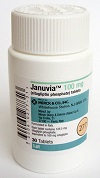 Last month, Merck & Co. ($MRK) said Januvia passed its heart safety test. Now, the much-anticipated TECOS trial has had its airing at the American Diabetes Association meeting, and the study authors say the drug is in the clear.
Last month, Merck & Co. ($MRK) said Januvia passed its heart safety test. Now, the much-anticipated TECOS trial has had its airing at the American Diabetes Association meeting, and the study authors say the drug is in the clear.
By itself, the trial is good news for Merck: Januvia is its top-selling drug, with some $6 billion in 2014 sales between the single agent and a combo pill, Janumet. In context, it's even better news. TECOS researchers found not a whiff of a link between the Merck med and heart failure, whereas an outcomes trial testing AstraZeneca's ($AZN) Onglyza flagged higher numbers of heart failure hospitalizations in patients using that drug.
When the positive TECOS data was announced in broad strokes, Bernstein & Co. analyst Tim Anderson said the trial's success could boost 2020 sales of Januvia and Janumet by up to 10%--taking the drug to $7.3 billion. Leerink Partners' Seamus Fernandez figured on a bigger uptick, with $6.4 billion in 2017 sales, compared with a previously estimated $5.76 billion.
 |
| Duke University's Eric Peterson |
Now published in the New England Journal of Medicine, the 14,600-patient TECOS study found no difference in cardiovascular problems among Januvia patients and placebo patients, including heart failure. "We've teased this data backwards and forwards and everything comes up looking like the drug does not have a cardiovascular safety signal," Duke University cardiologist and co-lead author Eric Peterson said of the study during an ADA press conference.
The Merck study dissipates a cloud that had been hanging over the DPP-4 drug class as a whole. After an Onglyza trial flagged a potential increase in heart failure risks, there was some concern that the risk might extend to the entire group. TECOS shows that it's not the case.
As Forbes reports, some experts think the DPP-4 class may be even safer than it now appears. Onglyza may have been the victim of chance, prominent cardiologist Sanjay Kaul told the magazine. That's the "most likely explanation for the heart failure signal" in the AstraZeneca-funded SAVOR trial, Kaul said. After all, the trial wasn't designed to test the drug's heart-failure risks as Merck's TECOS trial was.
An FDA expert panel didn't agree; in April, an advisory committee recommended that Onglyza's label highlight the data on heart failure risks. Overall, however, the group backed Onglyza's cardiovascular safety.
- see the release from Merck
- get the NEJM article
- check out the Forbes commentary
Special Reports: Top 15 pharma companies by 2014 revenue - Merck - AstraZeneca | Top 10 best-selling diabetes drugs of 2013